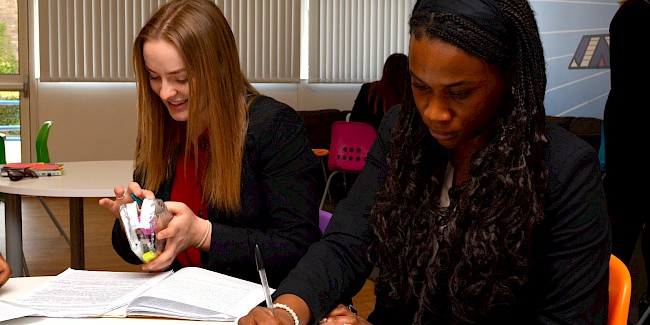Key Stage 5 Politics
Curriculum Overview
Students study the IB Global Politics course as part of the IB Diploma. All Politics students study the standard topics, those opting for higher level also study the higher topics.
| Year | Term 1 | Term 2 | Term 3 | Term 4 | Term 5 | Term 6 |
|---|
| 12S | International relations theory | Power and the state | International organisations | Human rights
Explanation of the IA | Human rights and the international HR system | Development |
| 12H | Borders | Presentation tutorials | Security | Security | Environment | Environment |
| 13S | Development | Peace and Conflict | Revision | Revision | | |
| 13H | Identity
| Poverty | Presentations | Presentations | | |
Year 12
At standard level, students study the theoretical basis for international relations and three of the four core topics. Students begin with an examination of the different theoretical theories that are applied to the study of international relations, such as realism, liberalism, Marxism and feminism. Students then study the nature of power within the structures of global politics, most obviously the state and international organisations. They then address the issue of human rights and begin to look at differing theories of development. In year 12, students also choose their engagement for their Internal Assessment. This is a personal study where students participate in some form of political activity and then write an essay that reflects upon the issue concerned, both from their personal experience and in the context of their wider studies of global politics.
In addition to their standard level studies, those students who choose the higher level extension study additional topics. In Year 12, they first examine the idea of borders, with an in-depth look at Britain’s exit from the EU as a case study. This is then followed by teacher led planning of a presentation on the topic- this serves as a mock for the assessed element of higher level Global Politics which is through two filmed presentations. This is followed by the study of two more topics in year 12- security and the environment. For each topic, students research a case study and deliver a presentation on this.
Year 13
Students complete their standard level studies by completing the remaining two topics. Firstly they complete their study of development by evaluating different approaches to developing a country. They then examine the issue of peace and conflict- looking at different theories of why conflicts break out, different types of conflict and, finally, different models of conflict resolution. As with year 12, each topic is linked to specific case studies to illustrate the concepts being studied.
In addition to their standard level studies, higher level students complete their study of Global Politics with the study of two more topics- the role of identity, such as cultural identity or gender, in Global Politics and, finally, poverty, which overlaps significantly with the development topic. Finally, students deliver presentations on each topic, submitting the best two for the final assessment.
Assessment
| Paper | Description | Standard Level | Higher Level |
|---|
| Standard IA | An active engagement in politics. Students then write a reflection on this engagement as an essay. | 25% | 20% |
| Paper 1
75 mins | A data response paper with four sources and four questions. Based on one of the four key topics in the standard course- human rights, power, development and peace and conflict. | 30% | 20% |
| Paper 2 (standard version)
105 mins | An essay-based paper based on the four key topics in the standard course. Students answer two essays, each from a different topic. | 45% | N/A |
| Paper 2 (higher version)
165 mins | An essay-based paper based on the four key topics in the standard course. Students answer three essays, each from a different topic. | N/A | 40% |
| Higher IA
| Two presentations. Each investigates a case study that illustrates the key themes of one of the higher level topics (borders, environment, poverty, identity and security) | N/A | 20% |
Further reading/resources
– ‘International Relations- A Very Short Introduction’ by Paul Wilkinson
– ‘Human Rights- A Very Short Introduction‘ by Andrew Clapham
– ‘The United Nations- A Very Short Introduction’ by Jussi M Hanhimaki
– ‘Orientalism’ by Edward Said
– ‘Factfulness‘ by Hans Rosling
– Vox Borders and Vox Atlas – shows short introductions to political issues
– Human Rights Watch Reports
– ‘Shadowplay’ by Tim Marshall
